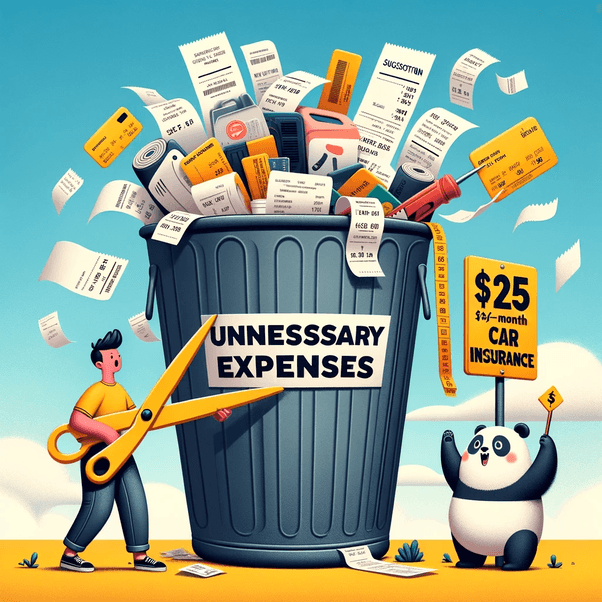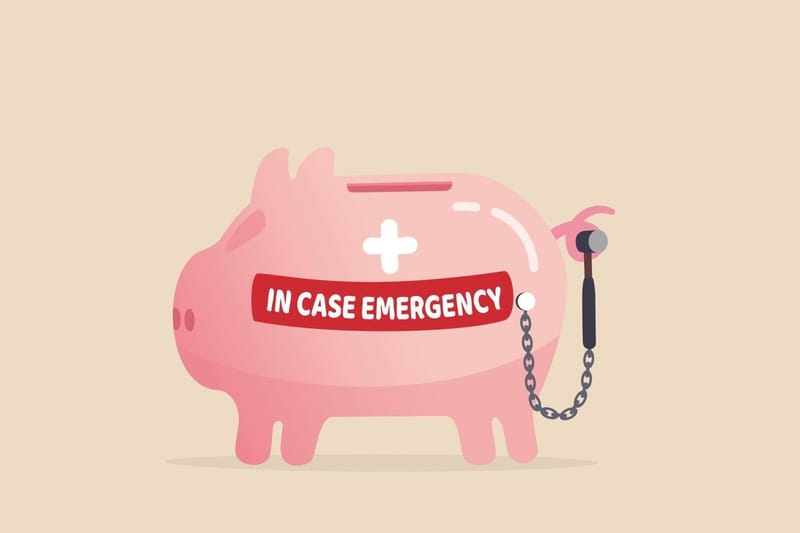Top Things to Save Up for as a Teenager
Ways To Earn Money For Teenager
Building a Strong Financial Foundation
Opening a Savings Account

It is very necessary for children to understand the value of money. Until they don't realize the importance of it, they can never learn why saving money is essential and how to save money as a teenager. Owing to the uncertain fluctuations in the economy of the USA and Canada, learning ways to earn money for teenagers should be given prominence as essential life skills that should be taught.
Following are the steps that can help teenagers save money:
A parent or a guardian must ensure that they open a bank account for their children which they should manage on their kid’s behalf.
Once the bank account or a savings account becomes active, parents should ensure that they should spend some time with their children to enlighten them about the ways to save money.
Parents must create awareness about the purpose of saving money. Teenagers must realize that savings are meant for investment or to earn some decent amount of income through interest.
Teenagers should be made mindful that they can take control of the account when they are 18 years of age and at that point they can also withdraw the money.
Apart from this, parents must consider this as a crucial responsibility to not only make their children aware of how to save money but also explain to them the key essential terms of banking:

Important Terms of Banking
Different types of interests (compound interest and simple interest) and interest rates.
Difference between a savings account and an investment account.
How to operate a direct deposit.
Once the child has enough understanding of the basic banking terms, he or she must start saving money. They must keep a certain amount aside at the end of the month which they can save by avoiding unnecessary spending.
After learning how unnecessary expenses can be controlled, then they can track spending once a week to analyze where most money is spent like grocery shopping, impulse buys or holiday gifts.
If the abovementioned steps are followed then in no time, savings habits will be inculcated in teenagers.
Saving Money Effectively
Saving money is important for the future. It does not only act as a source of income in the form of interest but it can also be a rich emergency fund that can be used in unforeseen situations. A savings account can help in savings money effectively. Setting financial goals for teenagers is a great way to develop smart saving habits early. Additionally, exploring ways to earn money for teenagers can provide an opportunity to contribute to savings. Understanding how to save money as a teenager can make a big difference in achieving long-term financial stability. Pairing this with tips on how to make money as a teenager ensures that teenagers can both earn and save wisely.
These goals can be achieved by depositing a amount of savings in the savings account regularly.

Setting Savings Goals
The intent to save money must be clear. This will help in setting a goal to save money. The goal or the decided target will keep the teenager motivated throughout which will enable effective habit of saving.
Savings goal should not be taken lightly by the teenagers else it will lead to unnecessary spending or purchases.
Once the goal is set, teenagers must use their bank account actively in order to deposit their savings in the savings account.
After some time, teenagers will gradually have the habit of saving money which will adhere to their savings goals. These goals will keep them motivated and will result in a good savings plan.
By maintaining uniformity in savings goals, teenagers can create a strict budget for themselves which can eventually become their financial goals for a better future.

Savings habit will result in the achievement of savings goals which will allow teenagers to improve their planning for the budget.
This will help the teenager to create a specific and measurable goal that will allow them to separate their expenses in two categories: necessary expenses and unnecessary expenses.
It will enhance their skill of spending from the money they want to save.
Cutting Unnecessary Expenses
Desires drive our instincts to make an expense. Considering the age of teens who find everything tempting and attractive, it becomes very difficult for them to avoid temptation; in such a situation, teenagers must be made aware of the expenses: unnecessary expenses and living expenses. Understanding financial goals for teenagers can help them prioritize their spending habits effectively.
Teenagers can also save by indulging in some free activities instead of paying for them.
Unnecessary expenses
Expenses are subjective. Purchases are not the same for everyone. Two people don’t think alike, and their choices might differ. A certain amount of money is spent by teenagers on impulse buys which can disrupt their budget. Some spend money beyond their income. Impulse buys can also lead to credit card debt if not managed properly.

Unnecessary expenses must be discussed and given a thought. It can include many things. For example, paying more for snacks while a teenager or a student can prefer to bring food from home.
It majorly includes impulse buys which disturbs expenses which are meant to be done in future. A good example of this can be traced from the habits of teenagers who don’t know the importance of money and buy non-essential things like extra shoes or fancy stationary items which has no value in long term.
Teenagers are often observed wasting their money on entertainment. For example, they often make impromptu and spontaneous plans for a movie with their friends under peer pressure.
Spending without thinking can also be a reason of financial stress.
Necessary Expenses
Teenagers don’t realise the value of necessary expenses. If a teenager make smart and wise purchases, it will not only effect their budget but will also improve their spending habits.
They must keep a check on their expenses once a week in order to balance the savings accounts which can prove to be cost effective in future.
Necessary expenses are categorised below:
Education: Tuition fees, books, stationary, etc.
Family vacation: Vacation is important for mental health. It can increase productivity and promises to give exposure different from the mundane life.
Healthy Food: As it has been said that a healthy mind lives in a healthy body so a teenager must not waste money on junk food, but rather spend more on fruits and items that are rich in ingredients. It is indirectly a form of investment that will result in a fit body.

Note: Books should not only be considered as an expense but it can also act like an investment. Students can earn some cash for themselves by selling the books after studying or reading them.
It can also give boost to financial goals as well as a source of income.
How Teenagers can Make Money as Students
Earning money as a teenager can be both empowering and practical, offering valuable lessons in responsibility and financial management early in life. Exploring ways to earn money for teenagers not only helps them develop financial discipline but also sets the foundation for achieving long-term financial goals for teenagers.
From part-time jobs to leveraging digital platforms, there are numerous opportunities available that cater to various skills and interests.
Teenagers can earn income while balancing their academic commitments, providing insights into both traditional and modern approaches to financial independence.
Here are some ways through which teenagers can make money:
Part-time jobs: Teenagers can seek part-time employment in industries such as retail, food service or hospitality which can help them gain valuable experience and earn some income.
Tutoring: Offering tutoring services in subjects in which the teenager excels to younger students or peers who need help. They can do it either in person or online.
Yard Work and Odd Jobs: They can provide services like lawn mowing, gardening, or household chores for neighbor or local residents.
Online Freelancing: Teenagers with skills in graphic design, writing, or programming can offer freelance services on various online platforms.
Reselling Items Online: Sell unused or unwanted items like clothing, books, or electronics through platforms such as eBay or local buy/sell groups.
Sell Handmade Crafts or Art: Teenagers can create and sell handmade crafts, jewellery, or artwork online with the help of Etsy or at local craft fairs.
Babysitting or Pet Sitting: In the USA and Canada, teenagers often provide babysitting or pet sitting services for neighbors or family friends can be a flexible way for students to earn money.
These insights can help teenagers earn money while balancing their studies and other activities.
Building an Emergency Fund
Everyone wants to foresee the future; unfortunately, it is not possible yet everyone tries to be financially prepared for it. Money can not be earned over the night and managing money is crucial to balance the lives in a situation of emergency and crises. A budget must be set aside with a certain amount of money as an emergency fund or a provision from the total income for automatic savings in savings accounts.
Emergency funds is a form of saving that can keep the cash handy in times of need.

Understanding the Importance of Emergency Savings
An emergency fund can act as a blessing in disguise that gives one's personal finances a solid foundation to stand on. It is a saving which can manage the income in the best possible manner. Such a fund can be helpful in the following ways:
Education: If a student has an urgent academic requirement, then they can utilise this fund instead of taking a loan on high interest rates.
Medical emergency: Medical treatment is expensive and it demands immediate fund. In such a case, extra cash is required. This extra cash can be attained from this fund or the savings accounts.
Others: The requirement of such funds can be subjective. However, savings can always be helpful.
How to Maintain Emergency Funds
To start an emergency fund, open a high-interest savings account and set an amount to transfer every month. A set amount will balance the income and savings. This exercise will keep a regular check on the budget which can reduce the amount of money which is to be spend by a teenager.
The regular maintenance of savings goal can regulate the cash in the savings account.
Adding some friction to easy transfers can help in healthy flow of cash in dire situations.
Increasing your Income
Saving is the secondary step of money management; the primary objective is to earn money. Money management is an essential skill, and it should abstain from emotional aspects. There are various ways to earn money for teenagers. Teenagers can earn money with the help of different sources. Students in the USA and Canada do part-time jobs along with their studies, which not only prepares them for the future but also teaches them ways to save money and achieve their financial goals for teenagers.
When teenagers as students start a new job, they keep checking account in order to know their financial status as well as try to align with their financial goals.
When teenagers as students start a new job, they keep checking account in order to know their financial status as well as try to align with their financial goals.
Teenagers make more money with experience and time. They utilise this money by depositing their cash in the bank or credit union through which they can easily earn a decent income through interest. This also saves them from financial stress.

When they start working, they realise the significance of money that makes them cautious about their purchase, cost of items and they also control their instinct on which they spend.
In this process, teenagers often marketing emails which makes them understand the market.
Earning Extra Money
According to Youth Economy report, more than seven out of ten kids (71%) say that it’s important to them that they make their own money, because financial independence gives them confidence to make their own decisions.
Even children who are too young to get a job legally can earn an allowance by helping out around the house. They earn some small amount of income which gives them a sense of belonging of having their own money.
They save their funds in a little piggy bank. Similarly, they plan a budget for their future purchase.
Nothing will improve income faster than getting a summer or part-time job.
Making the Most of your Allowance
Income can not reach its full potential until its saved or utilised in the most effective manner.
Encourage the teenager to understand that small purchases can really add up. Teaching them about ways to earn money for teenagers can also help them develop a sense of responsibility and financial discipline early on.
The mind of a teenager is usually busy with their illusion. They need attention and care so that they can understand things with clarity.
For example, one bottle of cola costs an average of $1.60, and $1.60 x 5 = $8 a week. This example will minimise their purchase of cola, and they would want to save more.
A weekly spending limit must be given to the teenagers which keeps them in the best position for future.
Smart Financial Decisions
Smart and wise financial decisions can really change life for the better. It does not only enable a balanced life during the time of youth but keeps many secure options until the time of retirement. Setting financial goals for teenagers early on can be a great way to build a strong foundation for the future.
Reduced expenses definitely promote a sound ratio of savings to investment. Exploring ways to earn money for teenagers, such as part-time jobs or freelancing, can also contribute to building financial independence while learning how to manage expenses.
Another sign of smart financial decision is the habit to save, it increases more money over the time.
Avoiding Impulse Purchases
Impulse purchases are the traps that are laid by the brands for the consumers so that they can spend their money on it, but one must avoid it in order to limit their purchase. Everything has a solution, so even this do!
Impulsive buying is not healthy and it can be controlled with the help of the following ways:
Some small steps can definitely be beneficial for the future like suggesting the teen to not save his/her card details onto the browser so that they have to enter their card details manually each time.
They can be instructed to unsubscribe from favorite shops, and email alerts. This can stop the teen from spending and help them find more money to save.
It is difficult to avoid temptations, whenever a teenager comes across such a situation, then ask them to wait for a few days. This cool off period will allow them to think about the pros and cons of their potential purchase, and this might dissuade them from buying it.
A child must be taught the difference between a need and a want.
Need verses Want

NEED
The concept of need is very crucial to understand. It generally refers to something that is essential or necessary for survival, well-being, or achievement of a goal.
Needs can range from basic psychological requirements like food and shelter. It implies a fundamental lack that must be fulfilled or satisfied.
WANT
It is referred to something desired but not essential for survival or well-being. Wants are often driven by personal preferences, aspirations, or cultural influences.
They may include items or experiences that enhance comfort or social status.
Therefore, teenagers must realise that needs are critical for basic existence and health, while wants are discretionary and based on individual preferences or desires beyond basic survival needs.
If teenagers learn the ability to wisely differentiate between a need and a want then they save effectively and track spending on a regular basis.
Create Awareness about Round up apps
Round up apps typically refer to mobile applications that automatically round up the user’s everyday debit or credit card purchase to the nearest dollar and invest the spare change in various ways.
It will allow the teenager to save or invest small amounts of money incrementally without actively thinking about it.
These apps will get linked to the teenager’s bank account or credit card and use the rounded-up amounts to invest.
Round-up apps are worth using as they work by rounding up anything the teenager spend to the nearest dollar and then saving the difference.
For example, Acorns, Stash, Qapital, etc.
It can be explained in simplified terms with this example, if a teen pays $2.60, these apps will charge his/her account $3 and put that 40% difference into another account or a separate savings account.
Use Cash back apps and Earn Rewards
Using cash back apps will pay a good return in terms of many incentives. These incentives can include travel rewards and credit cards can also be used to earn rewards.
In fact paying bills can also help in availing cashbacks and rewards.
Codeyoung’s Financial Literacy Course
At Codeyoung, we offer comprehensive financial literacy courses designed specifically for teens. Our interactive and engaging curriculum helps young individuals learn essential financial skills, from budgeting and saving to investing and understanding credit. These courses also introduce ways to earn money for teenagers, enabling them to take their first steps toward achieving financial goals for teenagers and building a secure financial future.
Enroll your teen in Codeyoung’s financial literacy program to empower them with the knowledge and tools they need for a secure financial future.
Benefits of doing Codeyoung's Financial Literary Course
Empowering Decision-Making: CodeYoung's Financial Literacy Course will empower teenagers to make sound financial decisions, whether it is choosing student loans, credit cards or savings plan.
Building Lifelong skills: Financial literacy course will equip teenagers with essential skills like:
budgeting
saving
investing
Avoiding Debt and Financial Pitfalls: By understanding concepts like interest rates and debt management, teens can make informed decisions and avoid common financial pitfalls. They can invest with the help of down payment.
Preparing for Independence: It will teenagers how to manage funds responsibly and preparing them for financial independence as adults.
Understanding Economic Systems: The course include lessons on economic principles, helping teenagers grasp the broader impact of their financial decisions on the economy.
Career Readiness: Knowledge of financial matters enhances career readiness, as it teaches teenagers about workplace benefits, retirement plans and negotiating salaries.
How To Save Money As A Teenager - FAQ
How can I teach myself to save money?
Teaching yourself how to save money as a teenager involves developing good habits and being mindful of your spending. If you're exploring ways to earn money for teenagers, you can start small, like babysitting, freelancing, or selling handmade items. Here are some steps to be taken care of:
Set savings goals
Create a budget
Differentiate wants from needs
Avoid impulse buying
Look for deals and discounts
Limit eating out and entertainment expenses
Open a savings account
Track your progress
Learn about personal finance
Practice discipline
What is the 30 20 10 rule saving?
The 30-20-10 rule is a simple guideline for budgeting and saving money. For teenagers wondering how to save money as a teenager, this rule can be a great starting point. Here's how it breaks down for a teenager:
30% for Needs: Allocate 30% of income towards necessities.
20% for Savings: Save 20% of income. This can be for short-term goals like buying a new video game or outfit, or long-term goals like saving for college or a car.
10% for Giving: Consider allocating 10% of income for giving back to others or supporting causes.
It's a practical way to manage money responsibly as a teenager and develop good financial habits for life.
Should I start saving money at 16?
Yes, you should definitely start saving money at the age of 16. The benefits of the same are listed below:
Building financial habits
Preparation for the future
Harnessing compound interest
Learning financial independence
Achieving long-term goals
How to teach kids about finances?
Teaching kids about finances is crucial for their future literacy. It can be achieved through Codeyoung's Financial Literacy Course.
Following are some tips for the parents:
Start early with basic concepts
Use real-life examples
Set a good example
Encourage savings goals
Allowance and budgeting
Tech delayed gratification
Discuss family finances
Explore educational resources
Involve them in financial decisions
Celebrate financial milestones
What should a 15 year old do with their money?
A 15 year old can do multiple things with his/her money like:
Save for future goals
Invest in education
Build an emergency fund
Support charitable causes
Invest in hobbies
Contribute to family expenses
Save for technology or gadgets
Learn about investing
Explore entrepreneurship
Spending money on leisure and entertainment
It's about balancing spending, saving, and investing in ways that align with goals and interests.